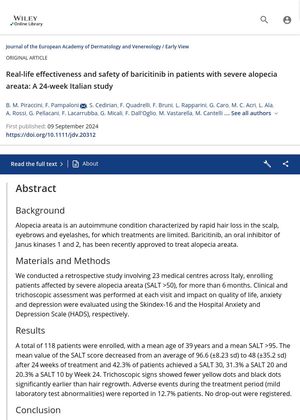Real-Life Effectiveness and Safety of Baricitinib in Patients with Severe Alopecia Areata: A 24-Week Italian Study
September 2024
in “
Journal of the European Academy of Dermatology and Venereology
”

TLDR Baricitinib effectively reduces hair loss in severe alopecia areata with mild side effects.
The study assessed the effectiveness and safety of baricitinib in treating severe alopecia areata over 24 weeks in 118 Italian patients. Results showed significant hair regrowth, with 70% achieving a 50% improvement in the SALT score. The mean SALT score decreased from 96.6 to 48, with 42.3% achieving SALT 30, 31.3% achieving SALT 20, and 20.3% achieving SALT 10. Mild adverse events were reported in 12.7% of patients, with no drop-outs. The study supports baricitinib as a promising treatment for severe alopecia areata, especially in early stages, and recommends trichoscopy for early response detection.









